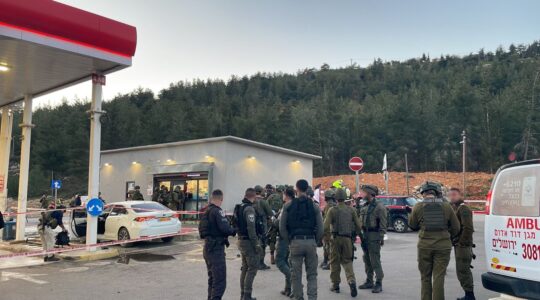TEL AVIV (JTA) – For children going to school, residents doing their shopping or anyone walking around the embattled town of Sderot, the danger zone is everywhere.
At any given moment, the Red Dawn warning system could sound, giving residents just seconds to make it to a protected space before an incoming Kassam rocket strikes. Many homeowners have taken to sleeping downstairs, while schools have constructed specially reinforced rooms for protection.
But in Sderot’s open, public spaces, residents say there simply are not enough protective shelters in which to run, and their absence during a rocket attack – a daily occurrence here – could mean the difference between life and death.
Seven years have passed since the rockets began to fall on Sderot, and the slow pace of construction of public shelters is among the concerns that has prompted some locals to question the government’s commitment to protect its citizens in the face of a prolonged war with no end in sight.
Alon Davidi, a social activist in the town, says the state still hasn’t put Sderot at the top of its priority list.
“We do not have the feeling that the government is going to bat for us,” he said. “You need to fight for everything. To get the schools protective roofs there was a Supreme Court case, for businessmen to get damages paid they had to sue, and we had to fight with the Defense Ministry until they gave us reinforced bus stops.”
The government says it is doing its part, but some residents along the Gaza Strip border believe they are being left to fend for themselves.
They say they watch as Jerusalem experiments with political and military solutions to the problem. Last week they saw Israel’s policy of blockading the Gaza Strip collapse when Hamas blew up the border wall between Gaza and Egypt. Israel’s sporadic assassinations and army raids have done nothing to stop the attacks, and an effective anti-rocket system to block the Kassams has yet to emerge beyond the development stage.
Officials defending the government’s record in aiding Sderot-area residents note the allocation of hundreds of millions of dollars for fortifying the Israeli schools, factories and homes near Gaza, and for psychological counseling. The government also is providing tax breaks to residents of the region, which has been granted official status as a front-line community.
The Prime Minister’s Office told JTA that together with Sderot Mayor Eli Moyal and the Ministry of Construction and Housing, it is reviewing options for additional fortifications. To date, the government has put some $247 million into projects to protect and assist Sderot, and another $130 million has been allocated for the next two years, officials said.
Alon Schuster, who heads the Sha’ar Hanegev regional council for the Israeli communities situated near Gaza – many of them kibbutzim near Sderot that also are in the Kassams’ firing line – said that although the funds are welcome, a more organized approach to the situation is lacking.
“The government needs to be making decisions both on the scope of its budget and the type of fortifications, including whether we are going to see more bomb shelters inside homes or some other sort of option,” Schuster said.
“Every ministry seems to work on its own, and given our current situation I think what is needed is a joint committee of the Prime Minister’s Office and the Defense Ministry so there will be proper coordination and assistance gets to those who need it.”
The Prime Minister’s Office said an interministerial task force handles coordination.
Last spring, media reports said the government had decided to build 200 bomb shelter rooms a month in Sderot homes, but activists say that has yet to happen. The Prime Minister’s Office would not address the figure and said it is still working out plans on how best to fortify the city.
Fundamentalist Palestinian groups in Gaza like Islamic Jihad and Hamas have fired more than 4,000 rockets at Israel since August 2005, when Israel pulled out of Gaza.
All of Sderot’s schools have been at least partially fortified, but a Supreme Court ruling has ordered the government to finish the job. Schools report that some parents took their children out of school because the reinforcements are incomplete. The government says it is abiding by the court order and noted plans to build 13 new schools in the Sderot area that will be built to withstand rocket attacks.
Meanwhile, 30 Sderot residents have filed another petition with the Supreme Court to force the government to reinforce 800 area homes. The government is fighting the appeal.
According to media accounts, during a court hearing on the subject, state prosecutor Dina Silber told the court that such a blanket decision to reinforce so many homes could set a problematic precedent in the event that other parts of the country eventually come under rocket attack as well.
Amid the back-and-forth between residents and the government, some grass-roots organizations have stepped in help fill in some of the gaps. One of the more prominent is Operation Lifeshield, which has been providing shelters at bus stops in the Sderot area. Each shelter, which is built to withstand a direct hit from a Kassam, costs $19,500.
Operation Lifeshield (www.operationlifeshield.com) was created as an emergency campaign after the Second Lebanon War to help communities in northern Israel. After the 2006 war, the group’s focus quickly shifted south to the Gaza border communities.
With funds donated by Jewish federations in the United States, Christian Zionist groups and individuals, Operation Lifeshield has been able to install 22 45-ton transportable shelters, mostly at bus stops, in and around Sderot.
“One of our big successes that we take credit for is that we have shown the government there is something that can be done on the practical level of helping the people,” said Josh Adler, one of the organization’s founders.
Sderot is a working-class town, and though surveys show that many would leave the city if they could, most do not have enough money to relocate, even temporarily.
The Knesset and the government have rejected suggestions that the state subsidize rental housing for Sderot residents who seek to live outside of the town while it is under attack.
Yedid, a social rights organization, has called on the housing minister to reverse that policy and find a way to assist those who want to leave.
“Those who are stuck in Sderot are those who always get stuck: the poor,” said Ran Melamed, deputy director of Yedid.
Yedid is lobbying for alternative solutions, such as for banks to freeze mortgage payments so residents can afford to pay rent elsewhere.
“If the government decides no one leaves Sderot, that is one issue, but then they are obliged to help and not leave people on their own,” Melamed said. “We are not advocating people to replace their homes. We want them to come back. But we want them to live without fear.”





